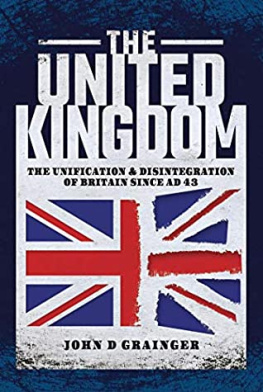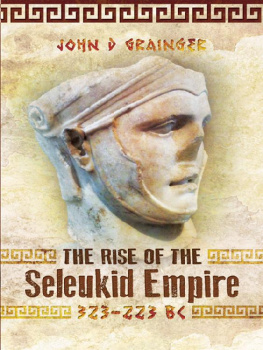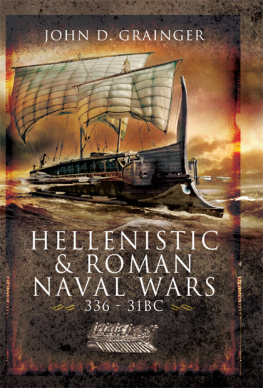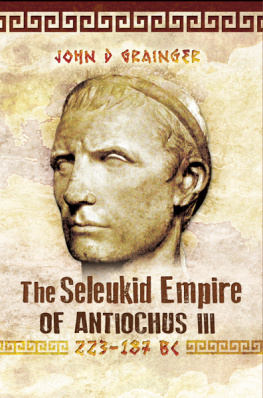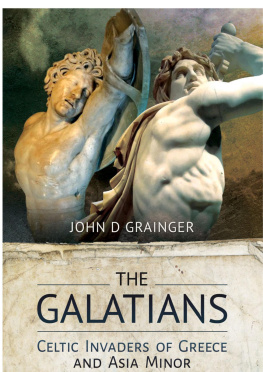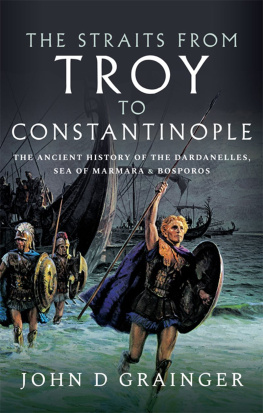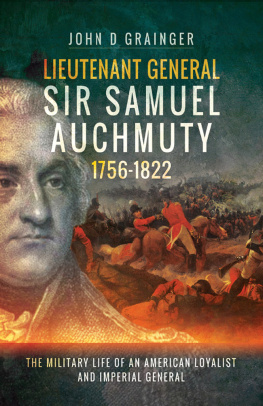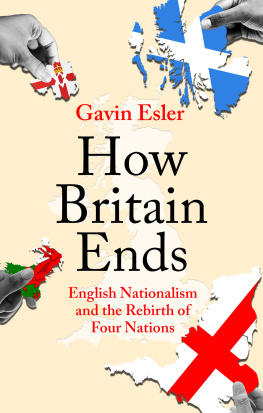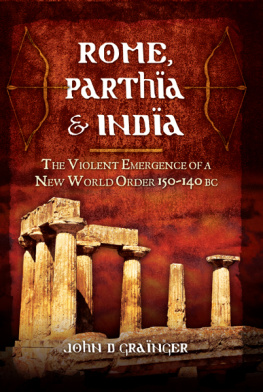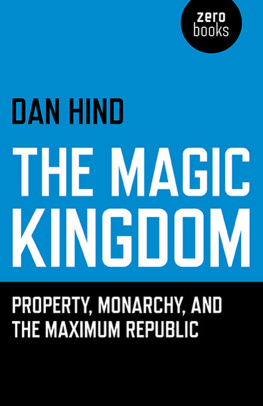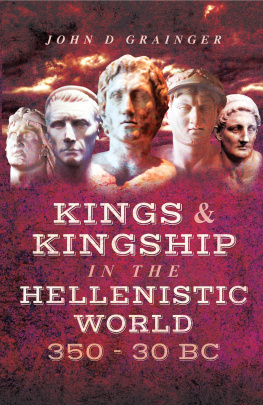The United Kingdom
The United Kingdom
The Unification and Disintegration of Britain since AD 43
By
John D. Grainger
First published in Great Britain in 2019 by
Pen & Sword Military
An imprint of
Pen & Sword Books Ltd
Yorkshire Philadelphia
Copyright John D. Grainger 2019
ISBN 978 1 52674 819 5
eISBN 978 1 52674 820 1
Mobi ISBN 978 1 52674 821 8
The right of John D. Grainger to be identified as Author of this work has been asserted by him in accordance with the Copyright, Designs and Patents Act 1988.
A CIP catalogue record for this book is
available from the British Library.
All rights reserved. No part of this book may be reproduced or transmitted in any form or by any means, electronic or mechanical including photocopying, recording or by any information storage and retrieval system, without permission from the Publisher in writing.
Pen & Sword Books Limited incorporates the imprints of Atlas, Archaeology, Aviation, Discovery, Family History, Fiction, History, Maritime, Military, Military Classics, Politics, Select, Transport, True Crime, Air World, Frontline Publishing, Leo Cooper, Remember When, Seaforth Publishing, The Praetorian Press, Wharncliffe Local History, Wharncliffe Transport, Wharncliffe True Crime and White Owl.
For a complete list of Pen & Sword titles please contact
PEN & SWORD BOOKS LIMITED
47 Church Street, Barnsley, South Yorkshire, S70 2AS, England
E-mail:
Website: www.pen-and-sword.co.uk
Or
PEN AND SWORD BOOKS
1950 Lawrence Rd, Havertown, PA 19083, USA
E-mail:
Website: www.penandswordbooks.com
List of Maps
Roman Britain
England Before Unification 800850
Wales Before Unification
Scotland Before Unification c.800
Scotland Unification and Losses 8501000
England, Conquests of Wessex 910956
England, The Shires
England, The Great Earls
The British Isles, 1066
Scotland in the Eleventh and Twelfth Centuries
The Norman Conquest in Wales
Norman Ireland
United Kingdom, Edward Is Conquests
Wales, Llywelyn the Greats Power, 1267
Wales, Partial Unity, 12841536
Scotland, Partial Unity
Wales, Unification 15361543
Ireland, Stages of English Colonization
Ireland, Stages of Unification, 15361603
United Kingdom, Union of Crowns, 15351707
United Kingdom, Parliamentary Union 17071920
United Kingdom, Devolution from 1920
Introduction
T he unity of the United Kingdom of Great Britain and Northern Ireland has been under threat for the past generation, and in the matter of Ireland for very much longer. Constant agitation by a vocal minority in Scotland who wish for independence, and by the even smaller number in Wales who wish for the same, has convulsed these islands repeatedly from 1970. But for a clear majority in Scotland, the great majority in Wales and though they have never been consulted probably virtually all of those in England, the internal unity of the archipelago is more acceptable than any conceivable division.
It took well over a thousand years to unite the countries of the British Isles, even without including the Roman period. It was a millennium during which, as a preliminary, the four countries were one by one united as separate states, and only then did they join into a union between them. It was not a tidy, inevitable process, nor was it one which has always been fully accepted by the populations of the constituent countries notably by a majority of the Irish. It is, however, one of the longest-lasting unifications of states anywhere in the world, and that by itself means that the process by which it was achieved is worth studying.
The first part of the process was the construction of unified states in England and Scotland out of a whole collection of minor kingdoms, and this process is the subject of Part I of this book. That this unification did not take place in Wales and Ireland provides a useful contrast and requires explanation. Further, it becomes clear in considering how the two successful unions were actually achieved that it was a process which took a long time, and one which was arrived at only in stages, some of them difficult and painful. The exercise of English power was a result of the unification of the southern part of the main island, and it involved some serious attempts to use that power to capture the rest of the islands. These attempts failed, and the actual unification of the archipelago eventually came about, after violence had failed, by legal processes involving negotiations and Acts of Parliament. While there were variations, and attempts at conciliation were made, it was not wholly a matter of conquest. It is this series of agreements and Acts which are now under threat.
The Scottish referendum of 2014 was a scandal of lies and misrepresentation, a populist nightmare of unfulfillable promises, unattainable dreams nightmares to the pro-unity supporters - and wildly distorted historical references; a misuse of history on a grand scale. The apparent decline in support for the dissolution of the English-Scottish union since then rather suggests that a degree of common sense is returning in Scotland. The general incompetence of the inexperienced Scottish National Party when in government, in such matters as education and the administration of the health service, and its lack of clarity on the issue of more independence referendums a classic case of fudge and prevarication has clearly suppressed any temporary enthusiasm for independence among non-members.
This book is written from the viewpoint that the union of England, Scotland and Wales has been of substantial benefit to the inhabitants of both countries and will continue to be so. The intention is to examine the processes in the past whereby, after many attempts and failures, the union eventually occurred. (Ireland, of course, is a different matter, and its history had been crafted in a very different way, though its unity with the bigger island necessarily brings it into consideration in a book like this.)
The near disaster, from the point of view of the British government, of the Scottish referendum did not dissuade the Conservative government from another similar adventure, with the result that the European Union referendum of 2016 was lost. What has happened to the sovereignty of Parliament? It is to discuss these very matters Scottish independence, membership of the European Union that the population elects its MPs, yet the MPs shrugged off the responsibility they were elected and employed to shoulder and handed it back to the people, who were then subjected to misleading and occasionally lying campaigns by the combatants the same people who agitated for the referendum. But the defeat of the European Union referendum has pushed the question of Scottish and Welsh independence out of sight for the present, apart from occasional pronouncements from Edinburgh of a generally oracular impenetrability. What the separation from Europe should do, of course, is bring the three countries closer together in the face of an extremely difficult problem. For, geopolitically, the result will be to unite an increasingly monobloc European continent against the United Kingdom, and, should relations turn hostile (and that is the implication of the referendum result), the Leavers will have accomplished something only Napoleon and Hitler had, very briefly, achieved.


